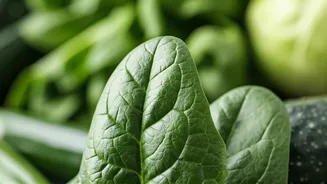Magnesium: Key Nutrient
Magnesium is a vital mineral that plays a crucial role in numerous bodily functions. It's involved in over 300 enzymatic reactions, including those related
to muscle and nerve function, blood sugar control, and blood pressure regulation. This essential mineral is required for energy production, DNA and RNA synthesis, and protein formation. Often overlooked in discussions about health, magnesium is critical for overall well-being. A deficiency can manifest in various ways, often subtly at first, making it difficult to pinpoint the root cause of certain symptoms. The body doesn't produce magnesium on its own; it must be obtained through diet or supplementation. Recognizing the signs of deficiency and understanding how to address them is the first step towards better health and vitality.
Recognizing Deficiency Signs
Nine common signs can indicate a magnesium deficiency. The initial signs often include fatigue and weakness, making daily activities feel more challenging. Muscle cramps and twitches are another hallmark, which can range from mild to intensely painful. Mental health can also be affected, with symptoms like anxiety and depression potentially worsening. Furthermore, a magnesium deficiency can contribute to sleep disturbances, leading to insomnia or restless sleep. Other indicators may include loss of appetite, nausea, and vomiting, affecting nutritional intake. High blood pressure can also be a sign because magnesium helps regulate blood vessel function. In more severe cases, numbness or tingling, and abnormal heart rhythms, may arise. Recognizing these subtle clues and seeking appropriate interventions is vital for managing the deficiency effectively and restoring balance.
Food Sources: Natural Fix
Fortunately, boosting your magnesium intake is achievable through dietary adjustments. Focusing on incorporating magnesium-rich foods into your meals can naturally improve your levels. Include dark, leafy green vegetables such as spinach, which are packed with magnesium and various other nutrients. Nuts and seeds, particularly almonds, cashews, and pumpkin seeds, are excellent sources that can be easily added to snacks or meals. Whole grains, like brown rice and quinoa, provide magnesium alongside fiber and other beneficial compounds. Legumes, including black beans and edamame, are another useful addition, offering a combination of magnesium and plant-based protein. Finally, dark chocolate (in moderation) can be a treat that also contributes to your magnesium intake. By incorporating these five food categories into your daily diet, you can progressively combat deficiency and support overall health.























